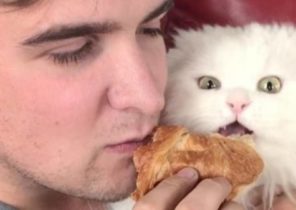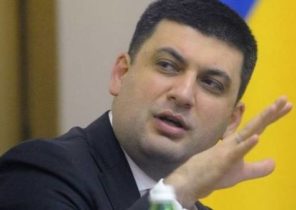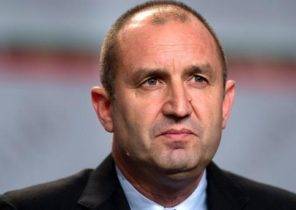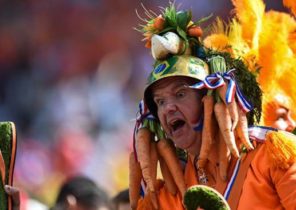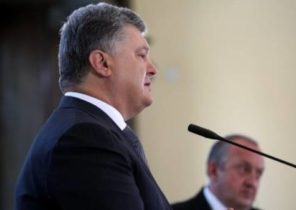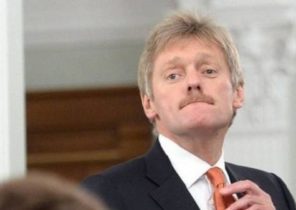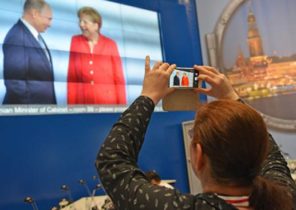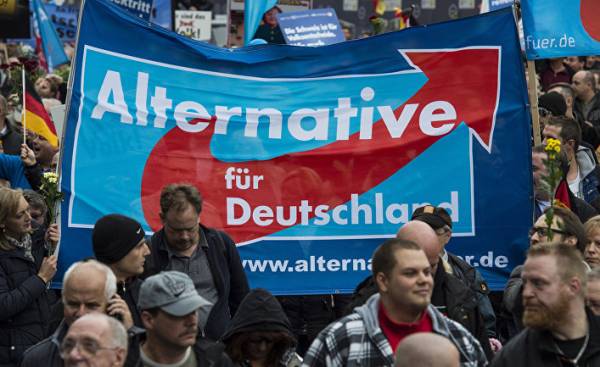
A small restaurant Club DJK Kaiserslautern is located on the outskirts of a large city in the Palatinate. It seems that time has stopped here: cheap beer, and the menu is mostly home cooking. At the entrance is lined journals DFB (German football Association — approx. transl.), near are information brochures ADH (Alternative for Germany — approx. transl.). In the back room sits a small group, on average, for 60 years, and discusses. It would be similar to the ordinary meeting of the Union. The only difference: the participants speak in Russian.
At the head of the table sits Johann Muller (Johann Müller): “the CDU for 30 years, it promises to address our demands, but nothing happened,” he says in German. Mueller is Deputy Chairman of the party “Unity”. Founded in 2013 with the slogan “Because we want to be proud of what we Germans” campaigning for votes especially among recent immigrants and migrants. Muller is a person capable of his charm and temperament to inspire a group of people. He routinely explains the program of the party, flavoring the story with jokes and stories from his life. The very notion of “Russian Germans” is, in his opinion, wrong, because, strictly speaking, it should sound like “Soviet German”. He actually, like, born in the Northwest of China, although has not seen his friends in the party politely smile, this joke they already know.
In political terms, we are “not left and not right”, says Muller. Although family policy, our position is very conservative, but we also want to advocate an unconditional basic income. The rest is “party for all”, says müller, not only for the Russian Germans and ethnic German repatriates. The fact that this party also comes to voters outside the Russian-speaking clientele, still doubtful. Web publishing and party magazine, which Unity, according to Mueller, monthly accesses 900 thousand voters in Germany, mostly written in Russian. Many informational meetings it is felt that the Russian language is the language of communication. On their pages on Facebook for this party is followed by several hundred users in the Russian network Vkontakte is more than 11 thousand. But the money from abroad, the party does not receive, says Mueller. In the end, 80% of the party members are Germans. Check out these data cannot.
Great fame “Unity” has recently received one of the statements of the Chairman of the party Dmitry Rempel. Rempel, who was a member of the SPD, and from 2010 to 2014 Vice-Chairman of the Cologne Council for integration, in the past often appeared on Russian state television. There he argued that in Germany because of the migration policy of the German government half a million Russian Germans are sitting on Packed suitcases to return to the Crimea. Of course, this is just taken out of context, says Mueller. No one wants war in Europe. Mueller shies away from issues of migration policy. The Chairman of the party in this respect, less caution. He has performed in the past at demonstrations in Nuremberg and Offenburg against foreigners.
The self-proclaimed representatives of the Russian Germans such as Johann Muller or Dmitry Rempel, Alexandra Dornhof (Alexandra Dornhof) are the problem. A sociologist with higher education works in the organization “German youth of Russia” as a referent for education and suffers from widespread prejudice. “The majority of Germans from Russia has found its place in Germany, built houses and raised children. We are sorry that we are all the time portrayed in a bad light, ” she says. In the circle of her friends no one voted for ADG or “Unity,” she says. When you meet Dornhof at her work place, then immediately struck by how big the difference between this world and the world Johann Muller and his friends at the party: a youth club in the middle of an attractive village with cottages in Frankfurt. In the hallway running around and noisy children, there’s a music room, a photo Studio and a fully equipped kitchen. Nothing here looks like it’s taken from the past. On the contrary.
As a referent for education, it organizes seminars and events to teach the youth of the Russian Germans to participate in democratic life. Her this is especially important, she says, as the voice of the Russian Germans is highly demanded in the elections to the Bundestag this fall. Already in the elections to the Berlin city Council last year, the CDU and ADG were handing out campaign literature of their parties in the Russian language. ADH even went ahead and translated all its basic party program. The great interest of the parties to the Russian Germans is explained by a glance at the following figures: up to four million Germans from countries of the former Soviet Union, primarily from Russia and Kazakhstan, since the end of 1980-ies returned to Germany. For comparison: the party of the “Left” won the election to the Bundestag in 2013, only 3.7 million votes, which corresponds to 8,6%. The voice of the Russian Germans in September, could play a crucial role.
Will the voices of recent immigrants do have fall so much also depends on how big is the participation in the elections in this group. Many of them due to their socialization in the Soviet Union rather apolitical. If all voted, just before put the cross on the CDU. In gratitude for the fact that the government of Helmut Kohl (Helmut Kohl) has made possible their return to Germany. The fact that this self-evident fact has not clearly felt at the youth events Dornhof. One of them is a seminar on elections in the German society. Here the youth met with party programs and learns how the electoral system operates. Project Manager Sebastian Rossner (Sebastian Rösner) makes a clear conclusion: “Many argue about whether the CDU for them to correct party.” It is not only about its migration policy. Another important theme is the old-age poverty, which particularly affected the Russian-Germans, as they partially does not count seniority from the time of the Soviet Union. In addition, many feel bypassed due to problems with the recognition of Russian diplomas of universities.
On the contrary, about the “great progress” in these areas, says Heinrich Tsertik (Heinrich Zertik). He is the highest representative of the Russian Germans. He was born in southern Kazakhstan and for 25 years a member of the CDU. Tsertik represents recent immigrants, almost all party committees. Since 2013, he sits in the Bundestag, and did not believe that the Russian Germans as particularly predisposed to ADH or to “Unity”. If at all there is, it is, in his words, “local phenomena due to protest voters” who could help ADG, he says. Much more ADG to create such protest also uses German and Russian, there are Russian immigrants who never belonged to the German minority who “have no idea that excites us, the Russian Germans,” says Tsertik. However, the mobilization attempts of ADH is also something good: first of all, the young Russian Germans began to show political activity. It is heard in youth seminars. In any case, he will go to the polls, said one young man. “Because here in Germany, it’s definitely something to give — unlike Russia.”
